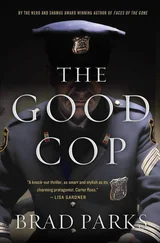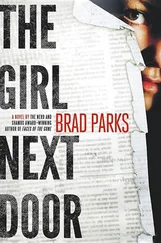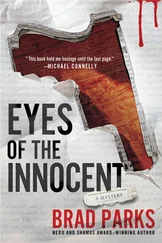Brad Parks - Faces of the Gone
Здесь есть возможность читать онлайн «Brad Parks - Faces of the Gone» весь текст электронной книги совершенно бесплатно (целиком полную версию без сокращений). В некоторых случаях можно слушать аудио, скачать через торрент в формате fb2 и присутствует краткое содержание. Год выпуска: 2010, ISBN: 2010, Издательство: Minotaur Books, Жанр: Триллер, на английском языке. Описание произведения, (предисловие) а так же отзывы посетителей доступны на портале библиотеки ЛибКат.
- Название:Faces of the Gone
- Автор:
- Издательство:Minotaur Books
- Жанр:
- Год:2010
- ISBN:9780312574772
- Рейтинг книги:3 / 5. Голосов: 1
-
Избранное:Добавить в избранное
- Отзывы:
-
Ваша оценка:
- 60
- 1
- 2
- 3
- 4
- 5
Faces of the Gone: краткое содержание, описание и аннотация
Предлагаем к чтению аннотацию, описание, краткое содержание или предисловие (зависит от того, что написал сам автор книги «Faces of the Gone»). Если вы не нашли необходимую информацию о книге — напишите в комментариях, мы постараемся отыскать её.
Faces of the Gone — читать онлайн бесплатно полную книгу (весь текст) целиком
Ниже представлен текст книги, разбитый по страницам. Система сохранения места последней прочитанной страницы, позволяет с удобством читать онлайн бесплатно книгу «Faces of the Gone», без необходимости каждый раз заново искать на чём Вы остановились. Поставьте закладку, и сможете в любой момент перейти на страницу, на которой закончили чтение.
Интервал:
Закладка:
“Oh, he’s tall. I mean, it’s hard to tell for sure, but I’d put him in the six-four, six-five range for sure.”
“Does he look like the sketch?” I demanded.
Tommy hemmed for five seconds, then hawed for five more.
“Don’t force it,” I cautioned. “The sketch could be a bit off. I’m sure Red would be able to pick the guy out of a lineup.”
“It’s. . it’s just hard to tell,” Tommy said. “He’s got a hat on, so I can’t see him that well. It’s not easy going from a sketch to a real face, you know?”
“Okay, okay. That’s okay,” I said quickly, to reassure myself as much as anything. “No problem. Where are you watching him from?”
“Two houses down on the opposite side of the street.”
“Good,” I said. “By the way, Irving Wallace just called me in the office not long ago. He invited me to brunch tomorrow at his house-said he had an important story to give me.”
“That’s scary,” Tommy said. “Are you going to go?”
“Oh, hell, no. Not when the quote he wants to give me goes, ‘Bam, bam, you’re dead,’ ” I said. “What I’m trying to figure out now is-”
“Oh, shoot,” Tommy interrupted. “He’s looking right at me. I gotta go.”
Tommy hung up and I felt a little panic setting in. But, no, he would be fine. If he saw Wallace coming, he’d be able to get away in plenty of time.
There was the small problem that if Wallace spotted Tommy, he’d know someone was on to him-even if he didn’t know it was us. It would make him more cautious.
Then again, this would all be a moot point in about fifteen minutes, when my new friends at the National Drug Bureau told me they were poised to arrest Wallace and execute a search warrant on his residence and office. I was about to get caught up in that daydream again when I reached the NDB’s Newark Field Office. Following L. Pete’s instruction, I pulled under the building. A guard stopped me for a moment, then waved me through after I identified myself.
The parking area was empty save for a smattering of dark, government-issue sedans. Apparently, anyone working on a Saturday was important enough to be furnished wheels courtesy of my tax dollars.
I took the elevator up to the lobby, where a couple of marshals-the same square-jawed types as before-were waiting for me. With a series of nods and polite gestures, they gave me the metal-detecting/wanding/patting routine. They took an extra moment or two over my recording device and let it slide only after I demonstrated it for them. But they paused over, of all things, my cell phone.
“Sir, I’m going to have to ask you for your phone,” one of the square-jaws said.
“Why, you need to make a call?”
“No, sir. Elevated threat level today. Cell phones can be used as detonators.”
“Okay,” I said, waving it around, “but no dialing any of those nine-hundred numbers you fellas like so much. I know they say there are young boys waiting to turn you on, but those are really middle-aged women doing those voices.”
“Sir?” he said, holding out his hand, unamused.
“Fine,” I said, handing it to him. “Can’t say I didn’t warn you.”
“Just a moment, sir,” he said, then picked up the phone on the wall.
My wait was much briefer than it had been the last time-the key difference being that they were marginally happy to see me. L. Pete himself came down to the lobby to retrieve me.
“Hi,” he said, extending his hand and smiling with far too much enthusiasm. “Thanks for being prompt.”
We shook hands and he gripped as hard as he could. Why do some short guys always try to prove they possess superior forearm strength? Did they want us to know that, despite their lack of stature, they could still open stubborn mayonnaise jars?
“Nothing makes a journalist move faster than the promise of an easy scoop,” I said.
“Right, right,” he said, waving me onto the elevator. He slid his card through the slot on the control panel, then pushed the button for the fifteenth floor. “Don’t worry,” he said. “You’ll be glad you came.”
As the elevator launched us skyward, I took the opportunity to turn on the recorder in my pocket. I suppose it wasn’t the most polite thing to be recording a conversation without the other party’s knowledge. But in New Jersey it wasn’t illegal. And what L. Pete’s boss didn’t know wouldn’t hurt him.
When we disembarked, I was ushered past a succession of closed office doors until we reached the one in the corner, whose name plate announced it belonged to Field Director Randall N. Meyers. L. Pete knocked softly.
“Yes?” a powerful voice inquired from behind the door.
“It’s me, sir,” L. Pete said.
The powerful voice replied, “Come in, Monty.”
“Who’s Monty?” I asked as L. Pete opened the door.
“Oh, that’s me,” L. Pete said. “I’ve gone by ‘Pete’ since grade school. But when Randy found out my first name was Lamont, he started calling me ‘Monty.’ ”
The Director surveyed the young man who followed Monty into his office and was almost disappointed. This was his nemesis? This was the greatest threat his operation had ever known? This was Carter Ross?
The Director buried his attention back into a pile of meaningless papers on his desk, not wanting the reporter to know he was being studied. In that quick glance, the Director had already seen enough to know Carter Ross would not pose any further difficulty.
He wasn’t armed-the cut in his trendy clothing left no room for a concealed weapon. And, physically, the Director could crush him. Carter Ross was nothing more than a pretty boy. There was no real meat hanging on his shoulders, no thickness in the chest or arms that might suggest he was dangerous. He looked like any one of those yuppies who spend time in the gym strictly for vanity, doing arm curls to get a small bulge in their biceps, with their only goal to look good in a tight T-shirt. They were not like the Director, who worked out for the express purpose of being able to overpower other men-for moments exactly like this.
The only real challenge of killing Carter Ross was what to do with him afterward. You couldn’t just dump his body down on Ludlow Street, like the Director had with the others. That would work for lowlife drug dealers, who would not be missed by anyone important. It wouldn’t work for newspaper reporters.
So the Director had spent his morning planning Carter Ross’s disappearance. Unbeknownst to him, “Carter Ross” had already booked an eight o’clock flight out of Newark airport to the Dominican Republic.
Making it appear Carter Ross was actually on the flight had taken a few hours of work. First, the Director asked one of the National Drug Bureau’s computer technicians to hack into the Eagle-Examiner’ s network, telling the tech it was part of an investigation and he had a judge’s order to do so. Once inside the mainframe, the Director accessed Carter Ross’s account and poked around long enough to get a sense of Ross’s e-mail style.
Then the Director wrote two e-mails-one to Harold Brodie, one to an e-mail account Ross had labeled “Mom amp; Dad” in his contact list. The e-mail to Brodie was more formal in its punctuation and sentence structure. The e-mail to Mom amp; Dad was more colloquial. Each said the same thing: their dear Carter had been so traumatized by the events of the past week, he felt he needed two weeks in the Dominican Republic to recover. The Director scheduled the e-mails to be sent at precisely 5:59 P.M. and 6:01 P.M., to make it appear “Carter Ross” had dashed off the e-mails then gone straight to the airport.
The next step was ensuring “Carter Ross” didn’t miss his flight, but that was easy enough. The National Drug Bureau had authorization to create passports for agents traveling under assumed names, so the Director created one with Carter Ross’s name and birthday-but Monty’s picture.
Читать дальшеИнтервал:
Закладка:
Похожие книги на «Faces of the Gone»
Представляем Вашему вниманию похожие книги на «Faces of the Gone» списком для выбора. Мы отобрали схожую по названию и смыслу литературу в надежде предоставить читателям больше вариантов отыскать новые, интересные, ещё непрочитанные произведения.
Обсуждение, отзывы о книге «Faces of the Gone» и просто собственные мнения читателей. Оставьте ваши комментарии, напишите, что Вы думаете о произведении, его смысле или главных героях. Укажите что конкретно понравилось, а что нет, и почему Вы так считаете.












